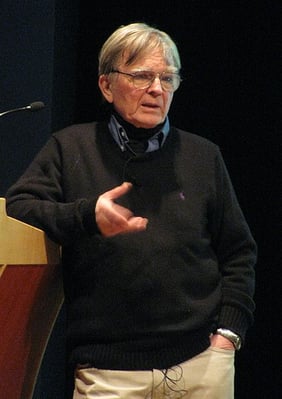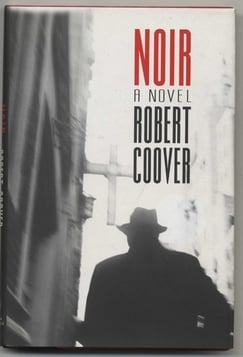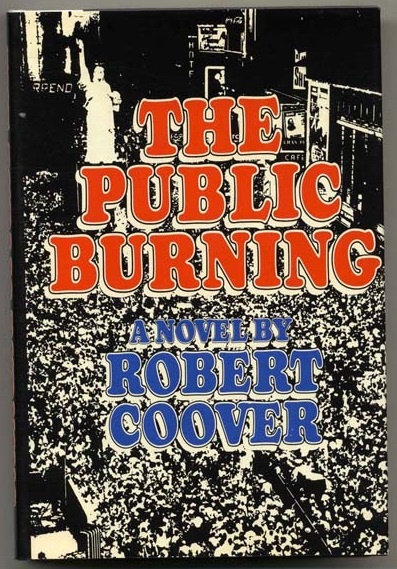Many great artists live rather modest, obscure lives. Of course there are those individuals, the Casanovas, the Byrons, and the Goethes of the world, who write interesting books and are interesting when written about. But this is not so much the case with Robert Coover, who turns 84 today. Prolific, soft-spoken, and wise, the author taught electronic writing at Brown University for years. No, Coover has not earned the publicity of his equals, such as Cormac McCarthy, Toni Morrison, and Thomas Pynchon. But to his readers, Coover has left behind a trove of books that are as vital and boisterous as any voice in American letters today.
 For an octogenarian, Coover has great faith in the future and vocation of literature (compare this to the ornery book Nobel laureate Mario Vargas Llosa released last year, entitled Notes on the Death of Culture). Part of what has kept his optimism alive is his sense of play. Forever a non-realist, Coover’s fiction defies conventions. His story “The Babysitter” is carried out through a collection of paragraphs in which contradictory and multiple scenarios occur. His novella Spanking the Maid is written similarly, in which the same day seems to happen again and again, with different events, outcomes, preoccupations, and tweaks of character. Robert Coover is one of the few worthy heirs to the likes of Kafka and Borges, and he joyously creates labyrinths and fantasy for his readers to excitedly travel through.
For an octogenarian, Coover has great faith in the future and vocation of literature (compare this to the ornery book Nobel laureate Mario Vargas Llosa released last year, entitled Notes on the Death of Culture). Part of what has kept his optimism alive is his sense of play. Forever a non-realist, Coover’s fiction defies conventions. His story “The Babysitter” is carried out through a collection of paragraphs in which contradictory and multiple scenarios occur. His novella Spanking the Maid is written similarly, in which the same day seems to happen again and again, with different events, outcomes, preoccupations, and tweaks of character. Robert Coover is one of the few worthy heirs to the likes of Kafka and Borges, and he joyously creates labyrinths and fantasy for his readers to excitedly travel through.
Always looking toward the future, it is no surprise Robert Coover is drawn to electronic writing, a new frontier of fiction that he has taught at Brown University for years. Hypertext, in which a reader can navigate a story from excerpt to excerpt, not dissimilar from a Choose-Your-Own-Adventure book, is a way to experiment with writing and reading that we are yet to fully understand. The book, Coover tells us, endures best when it adapts to the cultural and technological shifts of its day.
Electronic literature is but one of the many ways Coover is ahead of us. His masterwork is The Public Burning, released in 1977. It has been called the most brilliant and original American political novel by critic Larry McCaffery, who also considers it the fourth greatest twentieth century novel, between Ulysses and Gravity’s Rainbow. Despite the novel’s significance, it has time for readers to give this important work of art it its due.
The book’s still humble renown is largely the result of its stunted publication history. Fears that seem quaint to us today were very real for publishers in the late '70s, who feared that The Public Burning, by dramatizing Richard Nixon, Roy Cohn, and other prominent leaders, was a lightning rod for legal disaster. After making a brief appearance as a bestseller, The Public Burning was taken out of print by Viking Press, who feared the book’s popularity only made it more attractive to ruinous lawsuits.
 The book remained out of print for 20 years, before gaining the modest but passionate group of supporters it has today, with the help of a reprint by Grove Press in the late '90s. The book’s original publishers may have felt that its representation of Richard Nixon made it a liability, but its readers are doubtlessly grateful for it. Set surrounding the Rosenberg execution in 1953, a major narrator is established in the voice of Vice President Richard Milhous Nixon, as convincing and sympathetic as he could ever be. "I have never been one to do a very effective job of psychoanalysis," Nixon once said of himself in an interview. That fact is quite all right, because Coover does the job immensely well.
The book remained out of print for 20 years, before gaining the modest but passionate group of supporters it has today, with the help of a reprint by Grove Press in the late '90s. The book’s original publishers may have felt that its representation of Richard Nixon made it a liability, but its readers are doubtlessly grateful for it. Set surrounding the Rosenberg execution in 1953, a major narrator is established in the voice of Vice President Richard Milhous Nixon, as convincing and sympathetic as he could ever be. "I have never been one to do a very effective job of psychoanalysis," Nixon once said of himself in an interview. That fact is quite all right, because Coover does the job immensely well.
The voice of Nixon exquisitely mixes the probable with the exaggerated. The Public Burning gives us a character who is endlessly concerned about power and politics, who is resentful of Eisenhower’s nonchalance, paranoid about his five o’clock shadow and perspiration, and wary of a changing society. It is the richness of this character that allows Coover to take liberties with the dramatization of history. There is an episode, for instance, in which the soon-to-be-executed Ethel Rosenberg is visited by Nixon in Sing Sing Prison. As she is explaining her despair and desperation, it is not long before she finds the Vice-President vigorously making out with her. Slightly surprised by his own impetuosity, Nixon gives us a unique take on the “Feels-So-Wrong-Yet-So-Right” defense, while betraying his penchant for narcissism and grandiloquence:
I had not planned this. She tried to cry out, but I muffled her mouth with my own, keeping my eye at the door on the far end. She twisted in my grip, fought, pounded at me with her fists, but I held on. In a flush of weakness, I felt guilty about overpowering her like this, even started to release her and apologize—but no, goddamn it, that had been my trouble all my life, I didn’t know what I was doing but I did know I was through being polite, I was through being Mr. Nice Guy, I was all done with trying to outargue women, or men either, Uncle Sam included, to hell with respect and consideration, I knew better. If I’d learned anything from seven years of politics, it was that you didn’t get anything by dealing politely from weakness! The meek inherited nothing but regrets and failure in the world!
The long-windedness in this passage recurs throughout the novel. Coover gives us a vision of America as a nation of talkers. If anything, we are a country of proclaimers, of self-promoters and boisterous voices. One of the fabulist triumphs of the book is a personified Uncle Sam, whose preternatural superpowers, cartoonish rhetoric, and jingoistic grandeur makes a formidable emblem. Here we are introduced to Uncle Sam, this time as liberator of allied prisoners from a camp in enemy North Korea:
His eyes burning fiercely like Mandrake the Magician’s, a transfiguring glory in his bosom and a wad of chaw in his jowls, he reaches up and out, seeming to stretch and grow, and with a smile of Christian charity lets fly with the Pow’r that hath made and perserv’d us as a Union: “Whoopee-ti-yi-yo! it’s yore misfortune, little dogies, and none o’ my own!” he booms from above, and—ka-BLAM—decimates a whole paddyful of contentious gooks. “Come on boys! The only way to resumption is to resume!”
And so Uncle Sam frees the prisoners, and enlists them in the American fight for nobility and freedom.
 On the other side, there is "The Phantom," a nebulous, omnipresent menace that exists to undermine the fabric and goodness of American life. It, at times, manifests itself as a kind of mystic, demonic threat, but it is also capable of human possession, as a terrified Richard Nixon discovers when a cab driver is revealed to be an agent of the detested enemy. No matter what, the ultimate lesson is that at every corner, Americans must be vigilant. There is always something plotting and threatening our noble way of life.
On the other side, there is "The Phantom," a nebulous, omnipresent menace that exists to undermine the fabric and goodness of American life. It, at times, manifests itself as a kind of mystic, demonic threat, but it is also capable of human possession, as a terrified Richard Nixon discovers when a cab driver is revealed to be an agent of the detested enemy. No matter what, the ultimate lesson is that at every corner, Americans must be vigilant. There is always something plotting and threatening our noble way of life.
Coover expresses how outrageous fear holds sway over the American mind. We must always be on the lookout for the "Phantoms" that would have us ruined, and if this means more weapons, surveillance, and state power, so be it.
In Coover’s vision, we get America exuberantly exaggerated. Through the book’s theatrical motif, we are allowed to see ourselves amplified for examination and diagnosis. The novel’s final image is that of the corpse of Ethel Rosenberg, blackened and smoldering, shooting like a rocket’s red glare over the crowd of spectators in Times Square. The novel shows us, among other things, our taste for violence, scapegoats, and spectacle, as well as our capacity for self-justification and paranoia. While The Public Burning remains one of the funniest modern American novels, one might still get the impression that the book betrays an overarching pessimism—but that would be to ignore the existence of the book itself. Instead, The Public Burning comes from a firm and honorable American tradition—that of severe self-examination and criticism, so that we can one day be better and more worthy of our founding creeds. For both literature and country, Robert Coover grants profound hope.










